The Constitution (One Hundred and Thirtieth Amendment) Bill proposes that the prime minister, chief ministers and other ministers may be removed from their positions if they are in jail for 30 days on serious charges. They need not be convicted. The Jammu and Kashmir Reorganisation (Amendment) Bill and the Government of Union Territories (Amendment) Bill have similar intent. As the Union home minister, Amit Shah, tried to table these bills, an outraged Opposition tore up the copies and came close to violence. Instead of the Narendra Modi government’s claimed commitment to raise the moral standards in politics, the Opposition saw the 130th amendment bill as a bid to turn the country into a one-party police State or a dictatorship. It would be easy to lay a false charge against an Opposition state chief minister and have him or her jailed for 30 days. Destabilising Opposition-led states by various means is a charge that has been repeatedly laid at the door of Mr Modi’s government — and not without reason. For this, it has weaponised laws quite often. In this case, as a senior lawyer said, the Constitution itself is being weaponised. The proposed law could also be applied against National Democratic Alliance ministers who posed a challenge to Central leaders.
The Opposition’s fears are not baseless. The Centre has complete control of institutions such as the Central Bureau of Investigation and the Enforcement Directorate. Many governors, instead of being advised by their respective state cabinets as constitutionally directed, appear to obey the instructions from the Centre. In this context, the bill appears dangerous. But legally and technically too, it leaves space for objections. It destroys the separation of powers by not only making the executive judge, jury and executioner but by also cutting the justice system completely out of the process. It takes law and order out of state jurisdiction and makes it Central and allows unelected agencies to decide on the fate of elected leaders. It goes against the constitutional principle of the rule of law that everyone is presumed innocent until proven guilty. At every level, the new constitutional amendment bill seems to violate constitutional principles and open up the way for arbitrary steps by the Centre. The irony is that the government’s desire to raise moral standards appears to be leading it into questionable moral and legal means. The bills have finally gone to a joint parliamentary committee of 31 members. Will good sense prevail?










